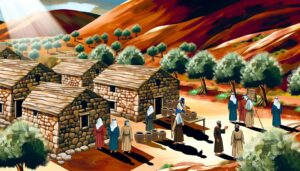Shake the Dust Off Your Feet Meaning Bible: Response
The phrase ‘shake the dust off your feet’ originates from ancient Near Eastern customs and appears in Matthew 10:14, Mark 6:11, Luke 9:5, and Acts 13:51. This directive from Jesus instructed his disciples to symbolically demonstrate divine disapproval toward towns that rejected the gospel.
The act signified a decisive separation from spiritual impurity and unworthy associations, rooted in cultural traditions that emphasized hospitality and severe social breach upon rejection. It underscores the seriousness of accepting the Kingdom’s message and highlights the importance of discerning disengagement from unproductive or harmful environments.
Explore further for deeper theological insights and historical context.

Shake the Dust Off Your Feet Meaning in the Bible: A Symbol of Judgment and Separation
| Biblical Reference | Meaning of “Shake the Dust” | Context and Insight |
|---|---|---|
| Matthew 10:14 | Sign of rejection and judgment | Jesus instructs disciples to do this when a town rejects the gospel |
| Mark 6:11 | Testimony against non-receivers | A symbolic gesture showing they are no longer responsible for them |
| Luke 9:5 | Clean break from those rejecting truth | A visual sign that their rejection is noted and accountability remains |
| Acts 13:51 | Paul and Barnabas’ response to rejection | Demonstrates moving forward without harboring offense |
| Nehemiah 5:13 | Shaking out of the fold of garments | Symbol of God’s judgment against oath-breakers and injustice |
Historical Context

Rooted in ancient Near Eastern customs, the phrase ‘shake the dust off your feet’ carries significant theological implications and is deeply embedded within the socio-religious fabric of biblical times.
This act was a symbolic gesture among the Jews to signify separation from Gentile practices and lands deemed unclean.
Scripturally, it appears in the New Covenant, particularly in Matthew 10:14 and Acts 13:51, where Jesus and later His apostles instructed disciples to perform this act when met with rejection.
It served as a physical manifestation of divine disapproval and a solemn warning to those who rejected the message of the Kingdom of God.
Historically, it underscores the profound delineation between sacred and profane, illustrating the gravity of accepting or rejecting divine truth.
Cultural Significance

The cultural significance of ‘shaking the dust off your feet’ is rooted in ancient Middle Eastern tradition, where it served as a symbolic act of rejection and separation from those who did not accept one’s message.
This gesture, often employed by Jewish travelers upon leaving Gentile regions, underscored a profound theological declaration about purity and communal boundaries.
Scripturally, it is employed by Jesus in the New Scriptures to instruct His disciples on how to respond to unwelcoming towns, highlighting its enduring moral and spiritual implications.
Ancient Middle Eastern Tradition
Examining the cultural significance of ‘shaking the dust off your feet’ reveals a profound ritual embedded in the social and religious fabric of ancient Middle Eastern traditions. This act was not merely a physical gesture but a potent symbol within the context of hospitality and purity laws.
In a region where hospitality was paramount, rejecting someone’s welcome indicated a severe breach of social norms. Dust, often associated with impurity, symbolized the rejection of any association with unworthy places or people.
The practice underscores the importance of maintaining spiritual and communal purity, echoing the deep-rooted values in the societal and religious structures of the time. Such actions were deeply understood by contemporaries as carrying significant weight in their cultural milieu.
Symbolic Act of Rejection
In the theological and historical context, ‘shaking the dust off your feet’ emerges as a profound symbolic act of rejection, denoting a decisive severance from those who are deemed obstinate or unworthy in both social and spiritual domains.
Scripturally, this act is rooted in Jesus’ instructions to His disciples (Matthew 10:14, Mark 6:11), underscoring a divine mandate to distinguish between receptive and unreceptive audiences.
Historically, this gesture echoes ancient Jewish customs, where Jews symbolically removed Gentile dust to signify separation from idolatry and impurity.
Hence, this ritualistic act not only demarcates spiritual boundaries but also serves as a demonstration to the gravity of rejecting the gospel message, amplifying its cultural significance within early Christian evangelism.
Biblical References

Scriptural instances of the phrase ‘shake the dust off your feet’ prominently appear in the New Covenant, particularly in the teachings of Jesus Christ. This phrase is found in several key passages where Jesus instructs His disciples on how to deal with unwelcoming towns and people, encapsulating a significant theological and historical principle of separation from unbelief and rejection.
- Matthew 10:14 – Jesus instructs the Twelve Apostles to shake off the dust if a town rejects them.
- Mark 6:11 – A similar directive is given to the apostles, emphasizing accountability.
- Luke 9:5 – Jesus again reinforces the practice while sending out the Twelve.
Jesus’ Instructions

Jesus’ instructions to His disciples on shaking the dust off their feet reflect a symbolic act of disassociating from those who reject the gospel message, underscoring a broader theological principle of accountability and divine judgment.
Rooted in Jewish customs, this act was a clear demarcation between the sacred and the profane, serving as a testimony against those who refused to listen. In Matthew 10:14-15 and Luke 9:5, Jesus emphasizes the gravity of rejecting the gospel, portraying it as a moral and spiritual choice with eternal consequences.
| Scripture Reference | Key Message |
|---|---|
| Matthew 10:14-15 | Rejection leads to judgment |
| Luke 9:5 | A testimony against them |
| Acts 13:51 | Apostolic practice |
| Mark 6:11 | Disassociation from rejection |
| Nehemiah 5:13 | Historical precedent |
These instructions reinforce the importance of the disciples’ mission and the seriousness of the gospel message.
Symbolism Explained

The act of shaking the dust off one’s feet symbolizes a deliberate and public renunciation of those who reject the gospel, highlighting the severity of their decision and the ensuing divine judgment.
This symbolic gesture, rooted in Jewish customs, signified separation from Gentile practices and denoted a clear boundary between sacred and profane.
Jesus’ instruction to His disciples to perform this act carries profound theological implications:
- Divine Judgment: Reflects God’s impending judgment on those who reject His message.
- Apostolic Authority: Affirms the authority of the apostles’ mission.
- Covenantal Boundaries: Reinforces the distinction between the faithful and the unfaithful.
This act underscores the gravity of rejecting divine truth.
Lessons for Today

In contemporary application, the biblical admonition to ‘shake the dust off your feet’ provides profound lessons on embracing new beginnings and releasing negative influences.
Scripturally, this act symbolizes a conscious decision to move forward without the burdens of past rejections or failures, aligning with the teachings of resilience and renewal found in the New Covenant.
Historically, it underscores the importance of discerning when to disengage from unfruitful endeavors, thereby fostering a mindset that prioritizes spiritual and personal growth.
Embracing New Beginnings
Understanding the phrase ‘shake the dust off your feet’ within its historical and scriptural context reveals profound lessons about embracing new beginnings and moving forward with purpose and conviction.
This biblical directive, found in Matthew 10:14, instructs the disciples to leave behind unwelcoming places, symbolizing a release from past rejections and the pursuit of new opportunities.
In today’s context, it encourages us to:
- Recognize when it’s time to move on: Identifying unproductive or harmful situations.
- Embrace change with faith: Trusting in a higher plan and seeking guidance through prayer.
- Maintain focus on the mission: Prioritizing spiritual goals over temporal setbacks.
Such teachings underscore the importance of perseverance and spiritual growth.
Releasing Negative Influences
Recognizing the importance of moving forward, we must also address the necessity of releasing negative influences that hinder our spiritual and personal growth. Biblically, ‘shaking the dust off your feet’ (Matthew 10:14) symbolizes a conscious separation from harmful environments.
Historically, this act was rooted in Jewish customs, signifying a break from unclean or unwelcoming territories. In contemporary terms, it teaches us to discern and distance ourselves from toxic relationships and situations, fostering a healthier spiritual journey.
| Biblical Principle | Historical Context | Contemporary Lesson |
|---|---|---|
| Shaking Dust Off Feet | Jewish Customs | Separate from Harmful Influences |
| Discerning Relationships | Early Christian Mission | Foster Healthy Connections |
| Spiritual Cleansing | Mosaic Law | Embrace Inner Peace |
| Prophetic Actions | Old Covenant Practices | Act with Divine Wisdom |
| Renewal and Growth | Apostolic Teachings | Pursue Personal Development |
Modern Interpretations

Contemporary scholars and theologians often explore the phrase ‘shake the dust off your feet’ as a metaphor for the deliberate act of moving forward from rejection or unproductive engagements. This interpretation aligns with modern psychological paradigms that emphasize the importance of setting boundaries and preserving emotional well-being.
Key points include:
- Historical Context: The practice originates from Jewish customs, signifying the severance of ties with those who reject the message.
- Scriptural Analysis: Found in Matthew 10:14 and Luke 9:5, the phrase underscores the importance of discernment in spiritual endeavors.
- Theological Expertise: It reflects a divine directive to prioritize fruitful engagements.
Such insights offer a profound understanding of this biblical directive in today’s context.
Practical Applications

In practical terms, ‘shaking the dust off your feet’ can be applied to various aspects of life where disengaging from unproductive or hostile situations is necessary for personal and spiritual growth.
Historically, this act, as instructed by Jesus to His disciples (Matthew 10:14), symbolized a rejection of those who did not welcome the message of the Kingdom of God.
Today, it encourages setting boundaries and moving forward when faced with resistance or negativity.
Scripturally, it underscores the importance of prioritizing one’s spiritual well-being and mission over fruitless engagements.
Conclusion
The phrase ‘shake the dust off your feet,’ rooted in historical and cultural contexts, carries profound biblical significance.
Jesus’ directive symbolizes a decisive break from those who reject His message. Some may argue this stance appears harsh; however, it underscores the urgency and gravity of embracing divine truth.
Modern applications of this teaching encourage believers to prioritize spiritual integrity and resilience. Consequently, the enduring relevance of this biblical principle continues to inspire contemporary faith practices.






